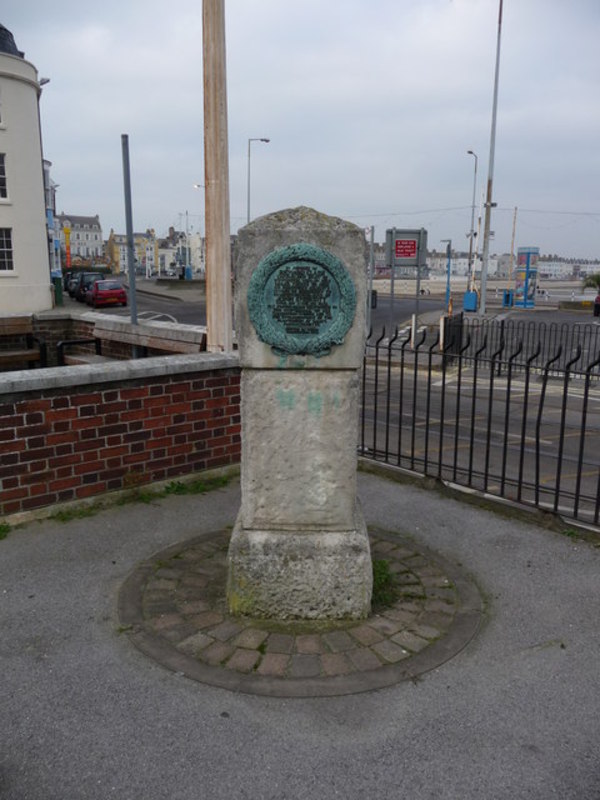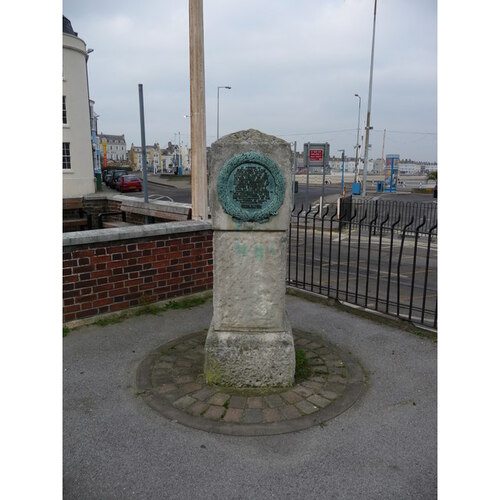
Source: Courtesy of Wikimedia Commons
CLARKE (Clark), RICHARD, of Weymouth, Dorset, English navigator and privateer who made voyages to Newfoundland; b. Buckhurst, Essex; fl. c. 1541–96.
Clarke went to sea and rose to be master of the Mary Fortune, trading to Bordeaux, in 1572. By 1582 when he appears in American waters he is a veteran sailing master and a skilled navigator. It is likely that he had already made fishing voyages to Newfoundland. In July 1582 he crossed the Atlantic to Newfoundland in command of the Susan Fortune, 200 tons, which was in consort with Sir John Perrot’s ship, the Popinjay, 60 tons, Henry Tayler master. The Susan Fortune belonged to the Southampton merchant and shipowner Henry Oughtred, who had a grievance against the Spaniards because of losses caused to him in Spain for which he could get no redress. He had commissioned Richard Clarke as captain and master to take his ship to Newfoundland, armed as a privateer, to seize Spanish and Portuguese fishing vessels in satisfaction of his losses. Sir John Perrot, at that time prominent in the administration of Wales, was apparently his partner, and he may have had some unofficial encouragement from anti-Spanish officials at court. William Hawkins had tried such a raid in 1571, while Sir Humphrey Gilbert had advocated in 1577 a clean sweep of the Spanish Newfoundland fishing fleet.
At the end of July Clarke had both his ships at Fermeuse, but the fishing vessels were in Renewse harbour, which the Susan Fortune could not enter. Therefore Clarke took a boarding party into harbour on the Popinjay and made to take over the three Portuguese vessels there, alleging to the French port admiral and to the masters of the English ships – including one of John Hawkins’s, which he found there – that he had a royal commission to take up Spanish shipping, though he later admitted to the English fishermen that his commission was from Don Antonio, the Portuguese royal claimant only (and even that was false). The ships were taken without resistance to Fermeuse where two of them were rifled and the third, the Sao João, 100 tons, laden with all the fish and gear she could carry, was brought away by a prize crew.
The master and part-owner Francisco Fernandes, went back to Portugal with the other two ships, carrying a testimonial signed by the English shipmasters as evidence of what took place. Clarke and Tayler got back to England with the prize after rifling other Portuguese ships at Newfoundland, and some 200,000 fish, a little train oil, and the ship were disposed of to Oughtred’s benefit. Fernandes brought suit against Clarke in the High Court of Admiralty but, so far as is known, he received no satisfaction, although Oughtred’s commission, when he produced it, was from the Duc d’Alençon and was dated after the ships had sailed. The raid disturbed the fishermen but yielded private revenge to Oughtred. It was not pressed home into a general attack on Iberian shipping in North American waters.
It was probably a vague report of Clarke’s voyage, together with some confusion about Sir Humphrey Gilbert’s in the following year, which led Anspach, in his History of the island of Newfoundland (1819), to invent a voyage by Sir Thomas Hampshire, who was said to have gone to Newfoundland in 1582 with five ships and, under a commission from Queen Elizabeth, to have regulated the drying stages used by the fishermen. No such man existed and no such expedition took place, even though the story finds a place in many Newfoundland histories.
When Sir Humphrey Gilbert set out for the North American mainland by way of Newfoundland in June 1583 he took Richard Clarke as his chief navigator. As master of the flagship, the Delight, Clarke had William Winter as captain on the way out, but exchanged him for Maurice Browne at Newfoundland. Clarke brought his ship into St. John’s harbour on 3 August, had a stout boat or pinnace built there which later saved his life, and took the Delight out again on 20 August, on course for Sable Island. On the 29th the vessel went aground in bad weather and was wrecked. Clarke was later accused of bad navigation, but defended himself vigorously, claiming that on the 28th Gilbert, who was sailing in the Squirrel, had, against his better judgement, instructed him to change his course. Clarke thought that on the new course he might strike Sable Island and he may well have done so, although some modern commentators insist that he had reached Cape Breton Island and that the Delight came to grief at the entrance to Gabarus Bay.
Clarke made a dramatic escape. The ship’s boat was on tow and Clarke, with 15 others, managed to get into her. Clarke took charge and with a single oar steered the overladen boat to safety in southern Newfoundland a week later, despite great hardships. Finding enough food to keep alive, he took his men westwards until they found a French Basque whale fisherman who brought them safely across the Atlantic. At Pasaje they were in danger from Spanish officials, but were concealed by the Frenchman and they slipped over the frontier into France, reaching England late in the year. The loss of the Delight was fatal to Gilbert’s plans; he turned back and was himself lost on this voyage. How great was his, or Clarke’s, responsibility for the wreck remains uncertain, but Clarke’s skill and resourcefulness were well illustrated by his conduct thereafter.
Clarke disappears from view for a number of years, though he may have returned more than once to Newfoundland to fish. He reappears as master of the Pilgrim, 100 tons, belonging to Richard James of Newport, Isle of Wight, in 1596. Fishing on the Banks, he was still, late in September, short of his full lading and of salt. He hoped to find some of the latter on land at St. John’s. Three French Basque vessels were in the harbour on 24 September. Next day he breakfasted with the admiral, Michel de Sancé of Saint-Jean-de-Luz, who offered help in catching fish to make up his lading. On the 26th Sancé, pretending illness, got Clarke to come aboard his ship and enticed a number of his men to follow him. Suddenly the French set on them, “crying out rendez vous, rendez vous.” On surrendering, Clarke and his men were imprisoned in the hold, while the Frenchmen went on to overpower and pillage the Pilgrim. After nine days the crew were released and given back their ship, which had been stripped down to a few sails and a little food. Thus Clarke was paid back for his actions in 1582. On his return to England Clarke and Richard James laid charges of piracy against Sancé and the rest without effect. We do not hear anything further about him.
Richard Clarke was clearly a skilful navigator who became well accustomed to transatlantic voyages and who might, but for misfortune in 1583, have played an important part in English American enterprises. With Richard Whitbourne he was one of the few English seamen to be found making voyages to Newfoundland over an extended period. His adventures in 1582 and 1596 illustrate the unsettled state of the fishery during this period.
Hakluyt, Principal navigations (1903–5), VIII. L. A. Anspach, A history of the island of Newfoundland (London, 1819). Voyages of Gilbert (Quinn). W. G. Gosling, The life of Sir Humphrey Gilbert (London, 1911). G. Patterson, “Termination of Sir Humphrey Gilbert’s expedition,” RSCT, 2d ser., III (1897), sect.ii, 113–27. For the 1582 episode add to the authorities in Voyages of Gilbert (Quinn), I, 55–56: PRO, CSP, For., May–Dec. 1582, Jan–June 1583; CSP, Spain., 1580–86; for that of 1596 see PRO, CSP, Col., 1574–1660, and PRO, H.C.A. 24/66, no.51.
Cite This Article
David B. Quinn, “CLARKE (Clark), RICHARD,” in Dictionary of Canadian Biography, vol. 1, University of Toronto/Université Laval, 2003–, accessed December 19, 2025, https://www.biographi.ca/en/bio/clarke_richard_1E.html.
The citation above shows the format for footnotes and endnotes according to the Chicago manual of style (16th edition). Information to be used in other citation formats:
| Permalink: | https://www.biographi.ca/en/bio/clarke_richard_1E.html |
| Author of Article: | David B. Quinn |
| Title of Article: | CLARKE (Clark), RICHARD |
| Publication Name: | Dictionary of Canadian Biography, vol. 1 |
| Publisher: | University of Toronto/Université Laval |
| Year of publication: | 1966 |
| Year of revision: | 1979 |
| Access Date: | December 19, 2025 |



